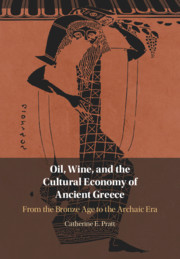Refine search
Actions for selected content:
23990 results in Ancient history
Dedication
-
- Book:
- Simplicity and Humility in Late Antique Christian Thought
- Published online:
- 26 March 2021
- Print publication:
- 25 March 2021, pp v-vi
-
- Chapter
- Export citation
Abbreviations
-
- Book:
- Simplicity and Humility in Late Antique Christian Thought
- Published online:
- 26 March 2021
- Print publication:
- 25 March 2021, pp x-xii
-
- Chapter
- Export citation
Index
-
- Book:
- Simplicity and Humility in Late Antique Christian Thought
- Published online:
- 26 March 2021
- Print publication:
- 25 March 2021, pp 190-194
-
- Chapter
- Export citation
Chapter 1 - Roman and Early Christian Attitudes toward Social and Economic Divisions
-
- Book:
- Simplicity and Humility in Late Antique Christian Thought
- Published online:
- 26 March 2021
- Print publication:
- 25 March 2021, pp 12-33
-
- Chapter
- Export citation
Chapter 2 - Christian Attitudes toward Social and Economic Divisions in Late Antiquity
-
- Book:
- Simplicity and Humility in Late Antique Christian Thought
- Published online:
- 26 March 2021
- Print publication:
- 25 March 2021, pp 34-55
-
- Chapter
- Export citation
Introduction
-
- Book:
- Simplicity and Humility in Late Antique Christian Thought
- Published online:
- 26 March 2021
- Print publication:
- 25 March 2021, pp 1-11
-
- Chapter
- Export citation
Chapter 3 - Tentmakers and Fishermen
-
- Book:
- Simplicity and Humility in Late Antique Christian Thought
- Published online:
- 26 March 2021
- Print publication:
- 25 March 2021, pp 56-84
-
- Chapter
- Export citation
Copyright page
-
- Book:
- Simplicity and Humility in Late Antique Christian Thought
- Published online:
- 26 March 2021
- Print publication:
- 25 March 2021, pp iv-iv
-
- Chapter
- Export citation
Acknowledgments
-
- Book:
- Simplicity and Humility in Late Antique Christian Thought
- Published online:
- 26 March 2021
- Print publication:
- 25 March 2021, pp viii-ix
-
- Chapter
- Export citation
Bibliography
-
- Book:
- Simplicity and Humility in Late Antique Christian Thought
- Published online:
- 26 March 2021
- Print publication:
- 25 March 2021, pp 164-189
-
- Chapter
- Export citation
Chapter 4 - Apostolic Simplicity and Elite Education in Late Antique Theological Controversies
-
- Book:
- Simplicity and Humility in Late Antique Christian Thought
- Published online:
- 26 March 2021
- Print publication:
- 25 March 2021, pp 85-118
-
- Chapter
- Export citation
Conclusions
-
- Book:
- Simplicity and Humility in Late Antique Christian Thought
- Published online:
- 26 March 2021
- Print publication:
- 25 March 2021, pp 158-163
-
- Chapter
- Export citation
Contents
-
- Book:
- Simplicity and Humility in Late Antique Christian Thought
- Published online:
- 26 March 2021
- Print publication:
- 25 March 2021, pp vii-vii
-
- Chapter
- Export citation
Chapter 5 - The Virtue of Humility in Late Antiquity
-
- Book:
- Simplicity and Humility in Late Antique Christian Thought
- Published online:
- 26 March 2021
- Print publication:
- 25 March 2021, pp 119-157
-
- Chapter
- Export citation

Oil, Wine, and the Cultural Economy of Ancient Greece
- From the Bronze Age to the Archaic Era
-
- Published online:
- 19 March 2021
- Print publication:
- 18 March 2021
Two - Developing a Relationship of Dependency
-
- Book:
- Oil, Wine, and the Cultural Economy of Ancient Greece
- Published online:
- 19 March 2021
- Print publication:
- 18 March 2021, pp 46-95
-
- Chapter
- Export citation
Contents
-
- Book:
- Oil, Wine, and the Cultural Economy of Ancient Greece
- Published online:
- 19 March 2021
- Print publication:
- 18 March 2021, pp vii-viii
-
- Chapter
- Export citation
Bibliography
-
- Book:
- Oil, Wine, and the Cultural Economy of Ancient Greece
- Published online:
- 19 March 2021
- Print publication:
- 18 March 2021, pp 332-395
-
- Chapter
- Export citation
Tables
-
- Book:
- Oil, Wine, and the Cultural Economy of Ancient Greece
- Published online:
- 19 March 2021
- Print publication:
- 18 March 2021, pp xii-xii
-
- Chapter
- Export citation
Acknowledgments
-
- Book:
- Oil, Wine, and the Cultural Economy of Ancient Greece
- Published online:
- 19 March 2021
- Print publication:
- 18 March 2021, pp xiii-xiv
-
- Chapter
- Export citation
